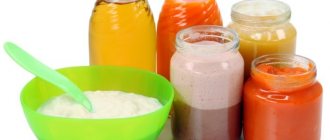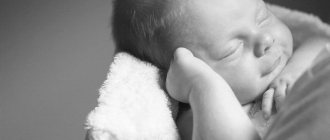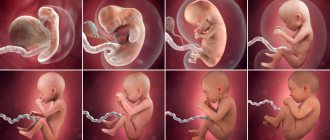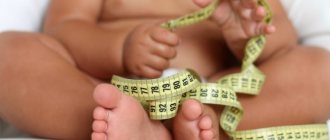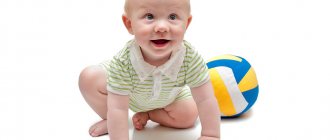The first year of life is coming to an end. The development of a child at 11 months is characterized by new indicators in physical development, the emergence of emotional and personality traits. At eleven months, your baby may make you happy with his first word or his first step. At the same time, he continues to develop emotionally and consolidate what he has mastered.
Physical development
By 11 months, the child, on average, reaches 8.5-10.5 kg (in weight) and 71-76 cm (in height). Some of his physical skills include:
- significant improvement in coordination of movements (the baby deftly picks up an object he likes, can place objects one on top of another, crumples paper, turns the pages of a book, etc.);
- the ability to stand on legs against a support or holding a parent’s hand;
- active crawling;
- ability to sit down from a vertical position;
- the ability to hold a mug or bottle with both hands and drink independently (some even confidently hold a spoon and try to eat independently);
- the ability to grasp small objects with two fingers, etc.
Some babies already take their first independent steps by 11 months (as a rule, 50% of children begin to walk independently before reaching one year). At this age, the child already has about 6 teeth (however, this is purely individual).
Emotions and psychological development
A child at eleven months is already quite mature for “communication” with other children. He looks at the kids with interest, touches them and even exchanges toys. The baby quickly gets used to new people in the house, and begins to recognize frequent guests and enjoy their arrival.
Since the baby's mobility has increased significantly, he actively explores the space around him and the properties of objects.
Now is the time to show your child that things can sometimes harm him. Do not verbally protect him from danger, but allow him to experience a negative experience controlled by you.
Show him what “hot” is using the example of not very hot tea, the baby will understand that “hot” means “hurt” and will avoid the dangerous iron and kettle.
A child's thinking continues to develop at eleven months. The baby already knows how to combine objects into groups in his mind; he can only pull out cubes or balls from the box with his toys if you ask.
Vision
At the age of 11 months, children are already able to visually assess the distance at which an object is located from them: is it enough to simply reach out to get it, or is it necessary to move closer to the object. Also, children during this period of life begin to look more closely at the details on objects.
At this time, it is important to monitor whether everything is okay with the baby’s vision: whether he is bringing the toy too close to his eyes, whether they are watering, whether they are squinting, etc.
Games and activities with your baby
A child at eleven months is actively involved in story-based games - carefully putting toys to bed, rolling cars, making appropriate sounds.
To improve coordination, you can invite your child to draw with crayons or wax pencils. Show him how to use them correctly; the baby will undoubtedly be delighted.
You can place “surprise chests” in different places in the apartment, crawling and bumping into bright shoe boxes, the baby will be happy to open them. Even a long-bored toy, discovered in such an unexpected place, will again arouse love in a child and captivate him for a while. The contents of these boxes can be completely different: put cars, dolls, rattles there and sometimes replace them with other items.
Facial expressions and speech
As already mentioned, a baby at this age tries to actively imitate sounds. Moreover, the first simple words appear in his vocabulary: “mom”, “dad”, “bye”, “am-am”, “lyalya” and others, which he no longer pronounces thoughtlessly, but putting semantic meaning into them. Also, his development at this age helps him to accompany his speech with gestures, for example: waving his hand when saying “bye,” extending his hand when saying “give,” nodding his head in agreement, etc.
Bad advice
"Do not be greedy! Share with the boy! Let the girl play with her doll!” These or similar words can very often be heard from parents on the playground, when one child does not want to share a toy or persistently takes someone else’s. And those who say this do not understand the main thing: a small child, until about 3 years of age, perceives the toy that he is holding as an extension of himself, his inseparable particle. And therefore, another kid who wants to get this toy tries to invade the child’s personal boundaries and literally “tear off” part of his hand.
If someone tries to take a toy away from your child, there is nothing wrong with saying in a friendly manner to the other child: “I understand that you want to take this car, but this is Sasha’s car and for now he wants to play with it himself.” You should explain to your baby: “You see that Petya also wants to play with your car, you can share if you want and when you are ready for it.”
Often children need time to rethink what is happening and if they switch to other activities with a toy, then they have no problem allowing other kids to take their things. But be prepared that some little ones won’t agree to share for any price, and that’s normal. This means the child is not ready yet.
You can offer an exchange.
Mental development
In the mental development of an 11-month-old baby, the following achievements can be noted:
- responds to simple requests such as “give”, “open your mouth”, “take”, “show”;
- recognizes intonations (understands when he is praised and when he is scolded) and semantic gestures (nod of the head, shaking a finger “but-but”, etc.);
- has a few simple words in his vocabulary;
- uses a number of simple objects for their intended purpose (for example, brings a comb to the head, a spoon to the mouth);
- builds a tower of 2-3 cubes;
- begins to distinguish generalizing words;
- plays simple story games (feeds a toy, puts a doll to sleep).
What should a child do without fail at 11 months of age?
If an 11-month-old baby lacks certain skills, you need to contact a specialist to find out the reason:
- the child is not yet sitting, or is sitting with support;
- the baby does not try to stand up against the support;
- the baby cannot stand at a support for any period of time;
- the child does not crawl or does it on his belly;
- the baby does not try to take his first steps;
- the child does not recognize loved ones, does not distinguish them from other people;
- the baby does not respond to his name;
- the child does not distinguish intonations, does not show emotions, does not rejoice, does not laugh.
How to help your baby develop
You can help your 11-month-old baby develop by doing the following:
- Invite him to play with the pyramid, demonstrating how to remove and put the rings on the rod.
- Show your child parts of the face and body, naming them one by one.
- Show and name objects to your child using books, Doman cards, etc.
- Always actively comment on your actions in the presence of the baby and name the objects with which you interact.
- Read books to your child, even if he doesn’t show that he’s listening to you, sing songs, recite short poems.
- Actively develop your baby's fine motor skills, which are directly related to his speech, using a finger maze, plasticine, kinetic sand, regular cereals, etc.
- Practice games with holes into which you need to insert any objects of your choice.
How to develop an 11 month old baby
- Stimulate your baby's development through play. Do not impose on him activities that are not yet interesting or incomprehensible. Always watch your child, note his favorite activities;
- develop your child physically. Do exercises with him, practice swimming, exercise on a fitball;
- Don't get carried away with walkers and jumpers. To develop walking skills, it is better to use rolling toys and your own stroller. The baby will hold onto them with his hands, which will give additional confidence in his own abilities;
- when visiting the playground, do not miss the opportunity to communicate with other children;
- read with your child. Allow him to turn the pages, tell him what is drawn, depict what sounds various animals make;
- dance with your child;
- The formation of fine motor skills will be greatly influenced by drawing, modeling, and playing with cubes and pyramids.
Finger paints are best for painting. It will also be interesting for the baby to draw on a surface dusted with flour or semolina.
It is better to start sculpting from soft wax plasticine. Show your child the simplest techniques - how to make a flagellum, a ball, how to “blind” a whole picture.
Some classes may seem difficult. But children, as you know, do not stop developing for a minute. And what seems impossible today will be easily done tomorrow.
Feeding the baby
By 11 months, the baby’s diet has already become quite varied, and breastfeeding (formula) is reduced to a minimum (as a rule, this is one feeding in the morning and one before bedtime). Some mothers of babies who have reached this age are already planning to wean their child off breastfeeding.
There are a number of simple rules regarding the nutrition of a baby at this age:
- food should be prepared for it by steaming, stewing or boiling;
- Do not add salt, sugar and other spices to food;
- you can slowly replace food in the form of purees with portions with small pieces;
- The baby’s diet must include: cereals, meat, fish, vegetables, fruits and dairy products;
- everything also remains prohibited: mushrooms, exotic fruits, honey, chocolate, coffee, tea, whole cow's milk, nuts, etc.
Food portions for a child 11 months old should be the following sizes:
- porridge – 150 g;
- meat or fish – 50 g;
- cottage cheese – 50 g;
- kefir – 150 ml;
- mixture – 200 ml.
The menu for children of this age roughly looks like this:
- Early breakfast - formula or breast milk.
- Breakfast - milk porridge (read more about porridge for first feeding) and 50 g of fruit for dessert.
- Lunch – vegetable puree with meat.
- Dinner – kefir, cottage cheese, vegetable or fruit puree.
- Late dinner - formula or breast milk.
As a snack between feedings, you can give your baby baby cookies, juice, etc.
Dream
At 11 months, a child sleeps on average 13-14 hours: about 11-12 hours at night and 2-3 hours during the day. At night, he no longer wakes up so often to feed (some don’t wake up at all at this age), maximum 2-3 times. As for daytime sleep, children at this age usually sleep 2 more times (60-90 minutes each), but for some one daytime nap is enough.
Mode
It is very important from an early age to accustom your baby to a certain daily routine, because this way he will know what he is going for, and it will be much easier for you to feed him lunch or put him to bed. Of course, the regime is an individual thing, and you must build a daily routine that suits you exclusively. We’ll just show you what the daily routine of an 11-month-old baby looks like (without reference to time):
- Waking up the baby after 11-12 hours of sleep and putting him to the breast.
- Hygiene procedures and morning exercises.
- Breakfast.
- Rest.
- Walk.
- Dinner.
- Quiet leisure (reading a book, playing with toys to develop motor skills, etc.).
- Rest.
- Outdoor games.
- Dinner.
- Second walk.
- Quiet leisure.
- Bathing.
- Attachment to the breast and sleep.
Nutrition and care
The child eats almost at the common table. The difference is that the food will be more chopped, fried, seasoned foods and semi-finished products will be excluded.
Formula and breast milk remain an important part of an infant's diet. The baby uses them before bed, at night, and often after waking up. The baby will most likely be attached to the breast more often. He will especially need this during illnesses and teething.
Even if the baby does not have teeth, give the baby meatballs, baby cookies and cooked finely chopped vegetables. This way the child will develop chewing skills. Don't worry about missing teeth. The baby's gums are very dense and strong in order to cope with soft pieces of food.
It will be useful and educational for the child to sit at a common table and have a meal in the company of relatives. In this way, a culture of nutrition and correct eating habits will be instilled.
Child care includes daily morning and evening procedures (washing, brushing teeth), bathing, cutting nails and hair. After sleeping and eating, put your baby on the potty.
If the baby resists, arches and refuses to sit on the potty, do not insist. Put this matter off for a month or two.
Video about baby development at 11 months
This video describes in detail and clearly shows how to work with a baby at 11 months old, and what educational games there are for children of this age.
Perhaps our other articles will also be useful to you: for example, about how to increase lactation by breastfeeding your baby, or, conversely, how to stop lactation if it’s time to wean your baby.
What can your baby do at 11 months? What development exercises do you do with him, what games do you play? Leave your comments on this matter.
Features of baby physiology
The child already has a fairly strong muscle system. Therefore, now it is not uncommon to see a stomping toddler. True, most often he still holds on to his mother’s hand.
At eleven months of age, it is possible to have four teeth - central incisors on the lower and upper jaws. Although this is all individual. And even complete absence of teeth up to a year is normal. So don't be upset if your little one still hasn't got them.
The baby grew up and became heavier. Characteristic for this age will be the presence of the following parameters: for boys, weight from 7.6 kg to 11.6 kg with height from 69.9 cm to 79.2 cm; girls weigh from 6.9 kg to 11.2 kg with height from 67.7 kg to 77.8 kg.
My little one already weighed 10 kg 800 grams, height – 78 cm.





